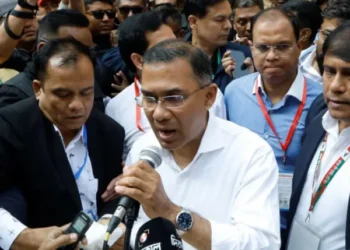Islamabad: The Supreme Court’s constitutional bench adjourned the hearing of election rigging and other cases without taking any action, while during the hearing of the military courts case, Justice Mussrat Hilali remarked that the trial of civilians is being done by expanding powers.
At the beginning of the court proceedings, the head of the bench, Justice Aminuddin Khan, said that the constitutional bench will hear only the case of military courts today.
With this, the Supreme Court started hearing the case of military courts, the defense ministry’s lawyer Khawaja Haris Rostum came to the fore and took the position in the arguments that the Supreme Court had ruled in the past that civilians under the army can be tried by a court martial.
Justice Jamal Mandokhel said that in the current case, who is the aggrieved party and the one filing the appeal? Khawaja Haris said that the appeal has been filed by the Ministry of Defense, Justice Jamal Mandokhel said that the Ministry of Defense is an institution of the executive, if there is a crime against the executive, can it itself become a judge and decide? The division of powers in the constitution is very clear.
Justice Jamal Mandokhel said that the constitution is clear that the executive cannot play the role of the judiciary, this is a basic constitutional question in the case of military courts.
Khawaja Haris said that if no other forum is available, the executive can decide, Justice Jamal Mandokhel remarked that there is a forum for anti-terrorism courts in the law, how can the executive itself become a judge while there is a legal forum?
Justice Jamal Mandokhel said that the Army Act has been limited to members of the armed forces only, Khawaja Haris said that it is not so, the Army Act is not limited to the armed forces only, it includes various other categories, I will come to this later.
Justice Jamal Mandokhel said that the Army Act has been limited to members of the armed forces only, Article 8(3) of the Constitution is about the discipline and performance of the forces, can criminal matters be included in Article 8(3)? The Constitution mentions citizens of Pakistan, not civilians.
Khawaja Haris said that the people of the Pakistani Armed Forces are also citizens like others, Article 175 does not apply to military court trials.
Justice Jamal Khan Mandokhel said that the Army Act was brought to bring the armed forces under the discipline of the army, Khawaja Haris said that if a civilian joins the armed forces, he cannot challenge any matter in the ordinary courts under fundamental rights.
Justice Jamal Khan Mandokhel said that martial law was also in force in our country for 14 years, the lawyer of the Ministry of Defense said that when a civilian interferes in the performance of the duties of the armed forces, the Army Act applies.
Justice Jamal Khan Mandokhel remarked that suppose a civilian tries to go to a check post, will this also be tantamount to disrupting the duties of the armed forces? With your arguments, the definition is becoming so broad that everyone will be included again.
Justice Muhammad Ali Mazhar said that there are two parts to this case, one part is related to declaring the provisions of the Army Act null and void, the other part is related to the trial of civilians in military courts.
Justice Mussrat Hilali said that Justice Jamal Khan Mandokhel’s question is very important, if there is a dispute between civilians at a check post, where will the trial take place? Justice Muhammad Ali Mazhar said that the answer to which crimes the Army Act will be enforced is in the Army Act.
Justice Mussrat Hilali said that the trial of civilians is being carried out by expanding the powers, the question is whether civilians can be tried or not.
Meanwhile, the Supreme Court adjourned the hearing of the case of civilian trials in military courts until tomorrow, Justice Aminuddin Khan said that tomorrow too, only military courts will hear the case, tomorrow the constitutional bench will not hear any case except the military courts case, tomorrow except the military courts case, the cause list of the rest of the constitutional bench has been canceled.
At the end of the hearing, Hafizullah Niazi, father of Imran Khan’s nephew Hassan Niazi, who was convicted by the military court, came to the rostrum and said that the court showed mercy, after which the military courts announced the decisions, 22 accused who were convicted in Lahore have been kept in the very high security zone, these accused are not getting rights under the jail manual.
Justice Muhammad Ali Mazhar said that these are not under-trial accused, the accused have been convicted, why are they not getting rights under the jail manual.
After this, the Supreme Court sought a response from the Punjab government for not getting rights under the jail manual.
Hafizullah Niazi said that sentences of 2 years or 10 years have been pronounced but detailed reasons have not been given. Justice Masrat Hilali said that detailed reasons have not been given.
During this, Justice Muhammad Ali Mazhar spoke to Hafizullah Niazi and said that he will give arguments about this in his turn.

























